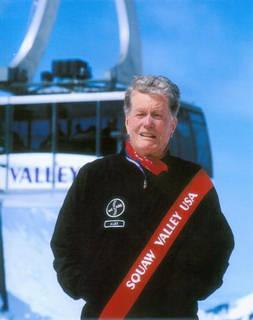Alex Cushing - Alexander Cushing, Squaw Valley founder
Squaw Valley founder was aggressive builder, promoter; brought 1960 Winter Games to California.
Alexander C. Cushing, one of the founders of Squaw Valley and the man who brought the 1960 Winter Olympics to the resort, died of pneumonia on Aug. 19, 2006 at Sea Cove, his summer home in Newport, Rhode Island. He was 92.
 Cushing was the son of the painter Howard Gardiner Cushing and Ethel Cochrane Cushing. He was born in New York on Nov. 28, 1913, and graduated from Groton School, Harvard (1936) and Harvard Law School (1939). He joined the New York firm of Davis, Polk and Wardwell and also worked for the U.S. Dept. of Justice, where he argued a case before the Supreme Court. The day after Pearl Harbor he enlisted in the U.S. Navy and was a member of the first officer training class at Quonset. He served in South America and in the Pacific for five years, retiring as a lieutenant commander.
Cushing was the son of the painter Howard Gardiner Cushing and Ethel Cochrane Cushing. He was born in New York on Nov. 28, 1913, and graduated from Groton School, Harvard (1936) and Harvard Law School (1939). He joined the New York firm of Davis, Polk and Wardwell and also worked for the U.S. Dept. of Justice, where he argued a case before the Supreme Court. The day after Pearl Harbor he enlisted in the U.S. Navy and was a member of the first officer training class at Quonset. He served in South America and in the Pacific for five years, retiring as a lieutenant commander.
In 1946, after returning to a Wall Street law office, Cushing took a ski vacation at Sugar Bowl, where he met Wayne Poulsen, developer of Mt Rose. At Poulsen’s invitation, Cushing toured Squaw Valley and agreed to invest in a project to develop a ski resort there. By 1948 Poulsen and Cushing had formed a partnership and in 1949 the resort opened with a double chair, a rope-tow and a 50-room lodge. The partnership didn’t survive the first winter, and Poulsen left to develop the real estate he owned in the valley, while Cushing stayed on as chairman of the ski lift company.
Cushing envisioned a vast and varied resort on the European model, and was determined to build it fast. He threw lifts up every peak within reach, which meant that Squaw opened super-steep terrain that would have been considered prohibitively dangerous anywhere else. Top skiers loved Squaw’s cliffs, and its immensely varied and occasionally challenging snow conditions. The steep terrain drew the attention of photographers and film-makers like Warren Miller, who spent a couple of winters there in the early days and helped to popularize the resort. In later years, the resort became one of the incubators for the craft of extreme skiing, famous for producing talents like Rick Sylvester, Robbie Huntoon and Scot Schmidt. The terrain also produced great racers like Jimmie Heuga and the McKinney clan.
In 1954, Cushing submitted a bid to host the 1960 Winter Olympics – and went, by dint of dogged lobbying of the IOC, to score one of the great sports marketing coups of all time. The ’60 games were the first ever to be televised, the first with an Olympic Village to house the athletes, and the first to be electronically timed. Television made Squaw Valley a household name, and helped the heady growth of the ski industry through the following decade.
Cushing’s aggressive growth policy drew the ire of state bureaucrats and environmentalists. He was a great believer in “build it first, then get permission.” He was an early investor in every ski lift innovation proposed, and the result, for some decades, was the most efficient uphill transport network in North America.
Cushing was inducted into the Ski Industry Hall of Fame in 1999 and into the U.S. National Ski Hall of Fame in 2003.
He had his eccentricities. For one thing, he was musical. The pianism was innocuous in the bar, but in later years he occasionally tormented guests with his own compositions played après-ski in the Squaw Valley Plaza. He also insisted that the employee uniforms be dead black, which may have saved laundry bills but drove photographers, and marketing directors, absolutely nuts. And he had some idiosyncratic ideas about how skiing ought to be taught, which made his ski school directors crazy.
Cushing is survived by his wife, Nancy; three daughters, Justine Cushing, Lily Kunczynski, and Alexandra Howard; six grandchildren, and three great grandchildren.

